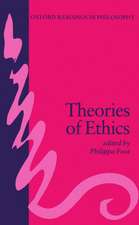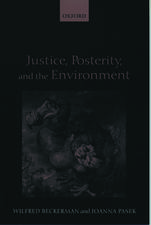Is a Little Pollution Good for You?: Incorporating Societal Values in Environmental Research: Environmental Ethics and Science Policy Series
Autor Kevin Elliotten Limba Engleză Hardback – 10 mar 2011
Preț: 551.92 lei
Preț vechi: 704.25 lei
-22% Nou
Puncte Express: 828
Preț estimativ în valută:
105.64€ • 114.79$ • 88.80£
105.64€ • 114.79$ • 88.80£
Carte tipărită la comandă
Livrare economică 09-15 aprilie
Preluare comenzi: 021 569.72.76
Specificații
ISBN-13: 9780199755622
ISBN-10: 0199755620
Pagini: 264
Dimensiuni: 236 x 163 x 28 mm
Greutate: 0.54 kg
Editura: Oxford University Press
Colecția OUP USA
Seria Environmental Ethics and Science Policy Series
Locul publicării:New York, United States
ISBN-10: 0199755620
Pagini: 264
Dimensiuni: 236 x 163 x 28 mm
Greutate: 0.54 kg
Editura: Oxford University Press
Colecția OUP USA
Seria Environmental Ethics and Science Policy Series
Locul publicării:New York, United States
Recenzii
Kevin C. Elliot provides an excellent synopsis of the challenges facing research scientists today.
One of the few (if only?) books that attempts to work across debates concerning values in science and social epistemology, to develop insights not just about science in policy but also policy for science. This kind of finely textured analysis of the specific social institutions around scientific practice is desperately needed. Elliott's book opens this terrain up for examination, debate, and hopefully, eventual improvement.
Kevin Elliott has taken on a particularly controversial scientific view, namely hormesis, and utilized it to clearly identify various places non-epistemic social values can and should be incorporated into core scientific activities that bear on public policy issues. This comprehensive, thoughtful, and careful discussion should now be part of the dialogue about social values in science-policy discussions.
This is a timely, well-researched and compelling book. Elliott admirably combines insights and strategies from philosophy of science with those of applied ethics to carefully analyze contemporary science and science policy around pollutants and human health. There is a growing interest in the philosophy of science community in bringing the work of philosophers to bear on contemporary social issues. This book stands out as a model for how to do just that.
Is A Little Pollution Good For You? by Kevin Elliott, is a wonderfully clear and insightful book dealing with the interplay between social values and economic and political interests in scientific research. Elliott's book is a must read for researchers, scholars, and students who are interested in the relationship between science, industry, and society.
One of the few (if only?) books that attempts to work across debates concerning values in science and social epistemology, to develop insights not just about science in policy but also policy for science. This kind of finely textured analysis of the specific social institutions around scientific practice is desperately needed. Elliott's book opens this terrain up for examination, debate, and hopefully, eventual improvement.
Kevin Elliott has taken on a particularly controversial scientific view, namely hormesis, and utilized it to clearly identify various places non-epistemic social values can and should be incorporated into core scientific activities that bear on public policy issues. This comprehensive, thoughtful, and careful discussion should now be part of the dialogue about social values in science-policy discussions.
This is a timely, well-researched and compelling book. Elliott admirably combines insights and strategies from philosophy of science with those of applied ethics to carefully analyze contemporary science and science policy around pollutants and human health. There is a growing interest in the philosophy of science community in bringing the work of philosophers to bear on contemporary social issues. This book stands out as a model for how to do just that.
Is A Little Pollution Good For You? by Kevin Elliott, is a wonderfully clear and insightful book dealing with the interplay between social values and economic and political interests in scientific research. Elliott's book is a must read for researchers, scholars, and students who are interested in the relationship between science, industry, and society.
Notă biografică
Kevin Elliott is Assistant Professor of Philosophy, University of South Carolina































